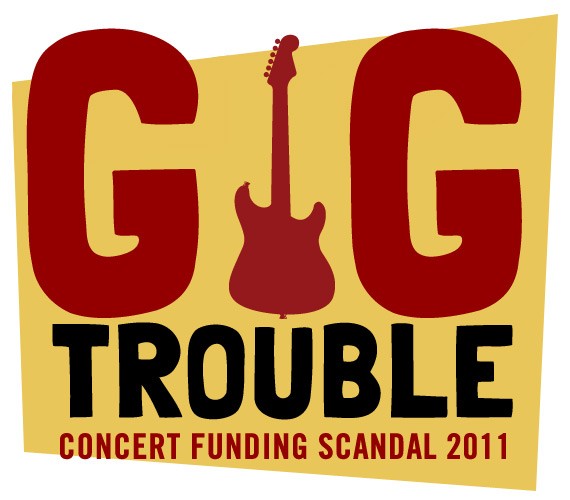Anstey ended up resigning over the scandal, but Kelly played a game of "ah-shucks, was that wrong?" and refused to heed calls for his resignation, even after a June report from auditor general Larry Munroe broadly castigated Kelly. ”Given the level of experience and involvement of Mr. Anstey and Mayor Kelly in the public sector," wrote Munroe, "each of these individuals should have known something out of the ordinary was occurring and should have asked more questions to determine if what they were contemplating and/or doing was appropriate, especially given the method of arranging for payments to be made to Power Promotional Events.”
Munroe based his report on hundreds of documents he obtained from City Hall, but he did not make those documents public. The Coast, however, filed a freedom of information request for the documents Munroe reviewed, and received those documents last week. Many concert-related documents appear to be missing, and others are highly redacted, but the file obtained by The Coast paints a detailed picture of the behind-the-scenes workings of City Hall as it attempted to turn the Halifax Common into a concert destination.
We now know that the city was pursuing lots of big named bands including The Eagles, U2, The Dave Matthews Band and Bruce Springsteen. We can also report that city officials turned down an offer from a promoter who wanted to put Rush on the Common with no financial assistance from the city, because officials instead wanted to go with a Kid Rock concert produced by MacKay, who could not manage to pay Kid Rock's upfront fee without hundreds of thousands of dollars in loans from the government. In the end, however, those loans weren't enough, and Kid Rock cancelled his Halifax show because his upfront fee had not been paid, then went and urged the other musicians coming to Halifax to demand more upfront money from MacKay.
The documents also suggest that city officials have misrepresented the true costs of hosting concerts; the real figure appears to be triple that told to the public. Officials also purposely kept poor concert attendance numbers from being known in hopes of hoodwinking promoters to keep producing shows on the Common. The documents also show that Trade Centre Limited president Scott Ferguson had previously been reprimanded for a ticket advance scheme that he later urged the city to adopt.
Where in the world is Halifax?
By outside appearances, the September 23, 2006 Rolling Stones concert on the Halifax Common was a huge success. We don’t actually know that to be the case—trustworthy attendance figures for the show have never been released, and city and provincial officials have not revealed how much financial support they dumped into the venture-—but outside appearances matter, and city officials wanted to build on that perceived success by bringing more concerts to the Common.Almost a year later, on August 13, 2007, the Daily News revealed that mayor Peter Kelly had prepared a “marketing card” to be sent to concert promoters around the world, encouraging them to look at putting on shows on the Halifax Common, “with little or no municipal costs to the promoter"; that is, that the city would cover the bulk of policing, fire, inspection and street closure costs that are typically billed to a promoter. The card claimed that the Rolling Stones “drew near 50,000 people.” That number is interesting because officials would later acknowledge that they were misrepresenting concert attendance figures to promoters, in hope of luring more shows to the Common.
News of the marketing card came as complete surprise to Trade Centre Limited, which was supposed to be doing promotional work for the concerts, and to city councillors. The very morning of the Daily News article, TCL’s Fred MacGillivray fired off an email to Peter Kelly. MacGillivray mentioned a number of concerns about the marketing card, including that it didn’t say where Halifax is. “How would any potential promoters in Europe or outside of Canada know where we are?” MacGillivray asks the mayor. “Would be better to state, Halifax, Nova Scotia, Canada.”
The next day, TCL’s communications manager Barb Stegemann wrote to HRM communications person John O’Brien and asked about the city providing money for costs related to an unnamed upcoming show, presumably the soon-to-be-aborted Celine Dion show. Specifically, Stegemann asked about $45,000 for “communications” related to street closures and the like, and $40,000 for “fencing, as this is a large show.”
O’Brien seemed startled by the request, and forwarded it to the city’s deputy CAO, Wayne Anstey, who was overseeing concert matters. “I’m not aware of any funds in my budget for dealing with concerts,” O’Brien complained. Anstey replied that “As to the publicity, I think we [the city] took this on as our responsibility for Rolling Stones, but the figure seems awfully high...What is your impression of the amount?” As to the fence, Anstey went on to say he was asking Mike Gillet, of Gillet Entertainment, which had put on the Stones show and was planning the Celine Dion show, for clarification about the fencing.
The episode shows that the city was dealing with concerts on the fly. There was no established procedure for who would cover what costs, or what those costs were. But there was the marketing card, promising promoters a break on their expenses.
A subsequent email from Roy Hollet at the fire department to various city officials underscores the problems created by this on-the-fly funding arrangements. “I have received a couple of calls from local promoters/event coordinators asking if the municipality waiving fees would also apply to their events. Some are charitable fundraisers who feel that they are having to cover various Fire Costs...A local production studio representative is informing me that they bring to the municipality the equivalent revenue that the quoted 40,000 people would bring... Would [the marketing card offer] apply to the other very large scale events such as the Tall Ships Festivals and other similar size events?”
Not exactly answering Hollet’s question, Anstey responded that $150,000 annually was budgeted for future concerts. “This $150,000 should be compared to the $100,000 that we committed to the Rolling Stones concert (one difference being that we did not specifically budget for that event and had to scrounge around for the money).”
Eagles, Metallica, Springsteen
In the fall of 2007 there was a flurry of internal emails related to a potential Eagles concert. Councillor Dawn Sloane seems to have been the initial contact person for the city. On October 16, 2007, Peter Kelly confirmed that “Creative Entertainment Group have the exclusive right to negotiate on behalf of the Halifax Regional Municipality (City of Halifax) for the Eagles, for one concert on the Halifax Commons in 2008.” That is, CEG would be working as Harold MacKay's liaison to the Eagles.Ten days later, someone from Power Promotional Events—presumably its president, Harold MacKay (the name is redacted)—wrote to Anstey about a potential July 12, 2008 date for Metallica. “Would the city consider a third date on July 12th for the Commons?” asks the emailer. (The documents don't at this point say what the second concert was; Halifax council had previously adopted a policy limiting the Common to two concerts a year.)
Anstey responds with several concerns, including “the capacity of the local market to support potentially three concerts. While that is primarily your concern from a financial perspective, it is also a concern to us in terms of the amount of rental we recover, but perhaps more importantly, the perception of the City globally if one or more of the concerts fails to attract a large crowd.”
Later that day, Anstey mentions that Peter Kelly is “setting up a meeting with the Minister of Tourism [Len Goucher] to tie down the Provincial Funding on the Country Concert and hopefully an understanding on any other possible concerts.” At this point the three 2008 concerts being discussed are the Eagles, Metallica and Keith Urban. Even though council was budgeting just $100,000 for concert costs, on November 21, 2007, Anstey emailed provincial civil servant Kelliann Dean to formalize a proposal evidently discussed earlier by Peter Kelly and Goucher in person. Anstey asked for the province to underwrite a $500,000 “loan/grant” from the city to PPE to put on an Eagles concert in June of 2008. The plan was for $150,000 of the amount to be a straight-out grant to PPE, with the remaining $350,000 to be repaid, $25 for each ticket sold over 42,500. This assumes a concert attendance of at least 56,500.
With fewer than 50,000 tickets sold to the Rolling Stones, city officials should have known that it was unlikely that 56,500 tickets would be sold for the Eagles. The $500,000 loan formula mapped out for the show arranged that $150,000 would be paid back to the city, so would be, were 56,500 tickets sold, in effect a grant to the city. But since it was unlikely that ticket sales level would be reached, the city was setting itself to lose that money, which was in addition to the $100,000 council had committed as support for Common concerts. As we'll see, even the $100,000 wasn't a reliable figure; the true costs of city services for Common concerts was actually $300,000—and by pretending the high attendance figures could be reached, the city was setting itself to lose all of it.
The Keith Urban “Country Rocks” show was announced in December, with city officials purposefully absent from the announcement, lest press questions veer into politically sensitive territory.
On January 5, 2008, Anstey told a provincial official that CEG, the agent negotiating for MacKay, were flying to LA to “bring Eagles issue to a head. They are also carrying on some discussions regarding the Dave Matthews Band and U2 (both huge).”
Maritimers played for chumps
Concert fever was running rampant in Halifax. Around this time, someone contacted the city about putting a concert in Citadel Hill, and wanted to know what the capacity of the fort was. Anstey replied that the configuration of the entrances and exits limited capacity to 2,000, but “if you could come up with a way to provide additional entrances and exits (presumably over the walls), the capacity could increase to as much 7,000. Presumably the added entrances/exits would have to be designed so as to be compatible with the historic structure and would have to be approved by the federal fire officials.”But if preservation of the signature historic feature of Halifax wasn’t an obstacle to putting on concerts in Halifax, something else was: Moncton, which would end up getting the Eagles.
A highly redacted document shows that in late January, Anstey forwarded an email from a CEG negotiator that said the Eagles management wanted more upfront money. “I got a call that night saying [redacted] was apparently not in the picture and it was between [redacted] and us however [redacted] offer was [redacted] and ours was [redacted],” reads the email. It will soon become clear what city was redacted.
On February 7, 2008, Anstey emailed Kelliann Dean, the provincial civil servant in the department of Tourism, with news that it “seems pretty certain” the Eagles will be going to Moncton instead of Halifax. But, continues Anstey, “CEG, on behalf of Power Promotions is now speaking to the agent for Paul McCartney...” Anstey wanted to know if the province would offer the same deal extended to the Eagles to McCartney.
“The hope is that if we are successful and are able to make an announcement before Moncton, it will kill the Eagles concert,” wrote Anstey.
The Eagles show in Moncton was produced by DKD, a Montreal firm.
On February 13, 2008, there is an email from Anstey to a person whose name is redacted. It reads: “[Events Halifax, an agency of TCL] are apparently saying that they and DKD had been in negotiations for 11 months to get the Eagles for Halifax. Councillor Andrew Younger says it was common knowledge on the street. Did you ever hear anything about DKD trying to get the Eagles before their recent efforts on behalf of Moncton? Did you have any inkling of this ‘common knowledge’? Have you been asked about their claim that you drove up the price?”
Although the name of the receiver of Anstey’s email is redacted, one could infer that it was Harold MacKay, and that Anstey was suggesting that Trade Centre Limited was working with DKD to try to get an Eagles show, while the city was working with MacKay's PPE to get the very same Eagles show. If so, this has two implications.
First, it demonstrates that the city was still acting independently from Events Halifax, even though city council’s concert promotion strategy directly called for all promotional activities to take place through EH.
Second, the competition between DKD and PPE served to drive the cost of the show up, but neither side worried much about that because the assumption was that either the province or the city would underwrite the increased costs. Ultimately, the costs got too rich even for Nova Scotia, and New Brunswick was able to make a better offer. New Brunswick subsidies for concerts are not public record.
The music industry pros in LA had played the Maritimes for chumps. By getting Halifax to essentially bid against itself in a price war, the Eagles’ management company was able to use the inflated Halifax figures to get a still-higher price out of Moncton.
City’s concert costs triple reported amount
Up to the time of this writing, Halifax council and the public have been told that the city’s cost for concerts was $150,000 for the Stones’ show, and then $100,000 annually after that.In a narrow sense that’s true: $100,000 was the amount dedicated to underwriting municipal expenses through hotel tax receipts. But the documents show that city officials were preparing to spend three times that much for concerts.
A May 1, 2008 email from Anstey to Keliann Dean in the provincial tourism department spells it out. Anstey reminds Dean that “you put forward the funding proposal” for the Eagles concert discussed earlier. “[T]he province would put up $500,000 of funding,” writes Anstey, “with $150,000 to be a grant to the Promoter, $200,000 to be repaid to the province and $150,000 to be repaid to HRM.”
Anstey was repeating the deal that was arranged the previous November, but said explicitly that the $150,000 repaid by the promoter to the city amounted to “half of the municipal expenses” for that show, the municipal expenses therefore totalling $300,000.
Based on the previous understanding, Anstey then outlines a new ask to the province for three concerts: Keith Urban, Paul McCartney and KISS. “Ideally, if we got all three shows, we would be looking for up to $450,000 (against one-half of the municipal costs of no more than $900,000), $300,000 as a repayable loan in respect of the KISS concert, and a $500,000 grant (sponsorship) for Carver [?] for the Springsteen concert. In total this would break down to a total Provincial Grant of $950,000 plus an advance repayable loan of $300,000.”
City officials appear to have been misleading the public as to city expenses for the concerts. The public perception was that the city was prepared to spend $100,000 per show, and that was an “in kind” grant to the promoter; in reality, the city was preparing to spend $300,000 per show, with $150,000 of that to be backed by the province. An additional $100,000 was to come from the hotel tax, but the remaining $50,000 would presumably simply be hidden in city departments’ budgets as unspecified operating expenses.
This misdirection would come to have large implications, as later, after the NDP formed a new government in 2009, the province would refuse to offer any concert funding. For the 2010 concerts, then, the city was left facing the full $300,000 tab, rather than the $100,000 budgeted for.
The McCartney nightmare
The documents given to The Coast contain nothing more from 2008, and nothing in 2009 until the approach of the Paul McCartney concert in July. So we still don’t know what happened to the proposed Springsteen concert, or why the McCartney concert was delayed a year.There was only one Common concert in 2008—Keith Urban, which had publicized attendance figures of 30,000. But as The Coast revealed in March of this year, the actual paid attendance was just 11,853. There must have been extensive discussion of the poor attendance in city offices, but for some reason the auditor general did not review it, and so those discussions were not included in the batch of documents given to The Coast last week.
The auditor general did report, however, that HRM agreed to a $300,000 advance to Power Promotional Events for the Keith Urban show, as follows:
HRM agrees to arrange for Ticket Atlantic, the ticket sales agent intended to be engaged by the Promoter, to advance to the Promoter against ticket sales the amount of $300,000, the said sum to be repaid from the initial ticket sales in respect of the concert.
The city’s legal department signed off on the agreement because “their reading of the clause was that it allowed the Municipality to make arrangements with Ticket Atlantic which was a service claimed and operated by Trade Centre Limited, the Provincial Crown Agency, to advance provincial funds against ticket sales to the extent of $300,000 and not HRM funds.” This was probably true for the first loan, but the city ended up backing $950,000 in such loans. PPE repaid the money, but that loan was the foot in the door and the stage was set for large improprieties to barge into the room—the city started simply negotiating for MacKay to have access to Ticket Atlantic funds, but that would later turn into the city guaranteeing the ticket advances and then finally to the city putting forward the loans itself, with no security whatsoever.
Enter Paul McCartney.
The next documents in the file given The Coast are a series of giddy email exchanges in July, 2010 between Fiona Kirkpatrick Parsons, a communications manager at Trade Centre Limited, and councillor Dawn Sloane. Parsons was trying to arrange the hanging of a banner welcoming “Sir Paul” on the parking garage at the airport. “PMC may not see it given where his plane will be landing, but it would be a great photo opp for media," says Parsons. "We could have another banner created to hang across the exit 5 overpass, so Sir Paul (if he’s looking) will see it on his way into town.” Sloane spoke of hanging banners from one of the bridges and along Grand Parade, and said she and Peter Kelly had discussed “projections on buildings like the Aliant building and that “the mayor also thought stargazer lights around the Metro Centre would be a good idea.”
The exuberance—some might call it embarrassing provincialism—for the McCartney concert was palpable around town, and that was reflected in stepped up government assistance for the show. In fact, the province paid McCartney’s $3.5 million upfront fee, with the understanding that it would be repaid through ticket sales. Moreover, the provincial Department of Tourism spent $300,000 on marketing and advertising for the concert, a flat-out grant to Power Promotions. Additionally, the province loaned PPE another $300,000 through Trade Centre Limited, with the understanding that it would be repaid once ticket sales met some still-unknown sales threshold, which was never met. The city too contributed $150,000 for municipal services. All told, after MacKay repaid the $3.5 million advance for McCartney, taxpayers ended up paying $750,000 for the concert. (Remarkably, other documents in the file claim that “Moncton had a higher offer.”)
Problem was, not enough people attended the show. As early as July 5, someone—likely Harold MacKay at PPE, although the name is redacted—wrote provincial, city and TCL officials to alert them that ticket sales “remain very slow (as of yesterday 20,200)” and that “we are currently looking at a $1.4 million loss.”
Three days after the July 11, 2008 McCartney concert, someone—again probably MacKay—notified the province that “paid attendance was 26,564 and we probably had approximately 29,000 onsite.”
Except for McCartney’s $3.5 million upfront fee, which was recovered in full, governments lost every penny they had put up for the concert. The total taxpayer subsidy for the show was therefore $28 per sold ticket.
The provincial subsidies and loans for the McCartney and previous shows were agreed to by premier Rodney MacDonald’s PC government, which was sympathetic to Halifax mayor Peter Kelly’s pleas for assistance. Kelly would go on to be floated as a potential Conservative candidate in the 2011 federal election. But Darrell Dexter’s NDP government, which took office in June of 2009, would end all provincial financial assistance for concerts.
As The Coast has previously reported, MacKay would repeatedly ask NDP officials to cover his loss on the McCartney show, which turned out to be $700,000, to no avail.
At the time, however, MacKay’s problem was immediate. The KISS show, one weekend after McCartney, was a similar attendance disaster—published reports said 40,000 people went to the show, but in reality just 21,420 tickets were sold.
For KISS, the arrangement that started for the Keith Urban show had by now morphed into a city-backed loan program through Ticket Atlantic: the city was now guaranteeing the loans through a city-owed Metro Centre bank account managed by Trade Centre Limited. All told, the city loaned PPE $2.4 million for the show.
After the McCartney and KISS shows, basic accounting principles seem to have been thrown out the window.
A July 29, 2009 email sent directly to mayor Peter Kelly from a person whose name is redacted, but more than likely MacKay, announces a creative solution: “In a meeting I had with Scott [Ferguson, president of Trade Centre Limited] today he mentioned that it might be possible to have funds covered through the TCL as long as he had coverage from his end from the City or Province. The concept would be that TCL holds as an advance on next year’s shows which we should have locked down by Nov/Dec as that it our strategy. Our plan confidentially would be for two more back to back shows and we have some very solid leads at the moment.”
In short, Ferguson was suggesting that MacKay’s loss on the McCartney show could be covered by the city or province advancing money based on future sales of tickets for shows that did not yet exist.
Lying to the world
A few weeks later, on August 18, 2009, someone—the name is redacted, but it’s clearly Harold MacKay, representing “a Dartmouth firm” that produced the McCartney show—wrote Percy Paris, the new minister of Tourism, asking for financial assistance for future concerts.Trying to convince Paris of the value of even of past failure, the letter explains:
In 2009 we were able to secure two mega concerts for the commons with Paul McCartney on July 11th and KISS on July 18th with media coverage extending all over the World. Public perception was that these concerts drew 50 to 60,000 and the industry believes this to be true as well with 40 to 50,000 being the real numbers in their minds. These events have set the stage again for Halifax and Nova Scotia to attract the biggest names in the business and the Halifax Common is now considered a “Great Concert Site.”
This is a remarkable bit of reasoning: the concerts were utter failures, but everyone thinks they weren’t, so you should loan me more money to put on more concerts. It appears, however, that city and provincial officials assumed the same reasoning: they knew that people weren’t going to Common concerts in large numbers, but they had to keep that truth from the public in hopes that... people would go to Common concerts in large numbers.
Only 26,564 people bought tickets for Paul McCartney, a former Beatle and one of the biggest-drawing performers on the planet, but the letter assures Paris that the next shows would be huge: “Attendance estimates for one would be 22,000 to 32,000 and the other would be 27,000 to 40,000.”
The letter proposes that a $350,000 loan from the province be paid back through $10 on each ticket sold for the future shows, with ticket sales starting in January, 2010.
Paris rejected the proposal the very same day he received it, according to an email sent to Peter Kelly, again presumably from MacKay. “This puts us in a very precarious position and we need to know asap if there is any other hope in resolving this,” the email writer tells Kelly. “Could we meet at your convenience?”
The documents attained by The Coast don’t say what the results of this meeting were.
Rush out
Somehow, Power Promotional Events stayed afloat, and in December the company announced the line-up for Country Rockfest 2010 for August 6 and 7, 2010.City, TCL and provincial officials knew that PPE was bleeding money, and yet there still seems to have been a soft spot for the company in governmental circles.
On January 29, 2010, Gillet Entertainment Group, a promotion company in competition with MacKay's Power Promotional Events, contacted city staffer Andrew Whittemore about the potential for putting a Rush concert on the Common on July 17 or 24, 2010. On March 11, GEG confirmed the July 17 date, and said the firm was ready to sell tickets.
In the meanwhile, however, PPE had announced a Halifax Rocks 2010 concert for July 23 and 24, with Kid Rock leading the line-up on the 23rd and Black Eyed Peas the 24th. Evidently, this show trumped the Rush show, and so on March 12, Anstey wrote GEG saying there was no way Rush could play the Common.
"We are not prepared to deliver up the Common site for your show this year," wrote Anstey to GEG. "I hope that this decision does not impair the possibility of future ventures in Halifax."
The Kid Rock show, however, was not a solid go. Just three hours after Anstey wrote GEG to prohibit the Rush show, a person—probably MacKay, although his name is redacted—wrote to Anstey saying that “our plans are close to being final and I would like to meet with you to discuss this and seek your advise on our plans to approach Prov Gov’t.”
The city apparently rejected a Rush concert on the Common from a promoter (GEG) who didn’t even ask for government funding in favour of a Kid Rock show produced by a promoter (MacKay) who couldn’t put it on without government funding.
Ferguson had previously signed improper loans
The Dexter government continued to refuse to fund concerts, even though mayor Peter Kelly appealed directly to premier Dexter himself. And MacKay didn’t have the funds for Kid Rock’s upfront fee.On March 17, someone—again, presumably MacKay, although the name is redacted—asked Anstey for a loan contract for the Halifax Rocks show, with the amount raised from a previously agreed $400,000 to $500,000. On March 23, the same person again writes Anstey to suggest that the Black Eyed Peas concert be announced publicly, and “get tickets on sale right away [so] Scott [Ferguson at TCL] would have enough cash on hand to be able to assist us with the second night a couple of weeks later.”
That is, the plan was to use Black Eyed Peas ticket sales to pay Kid Rock’s advance fee. This is madness, because had either act cancelled, there would be no money with which to refund ticket holders.
Neither was there money in the Metro Centre account to lend MacKay. Through March, MacKay was being advanced money for both the country and the rock shows, and the city’s account was being bled dry. Anstey was signing authorizations for $400,000 one day, $200,000 a few days later, and promising more should the account get topped up. But MacKay still couldn’t pay Kid Rock’s upfront fee. (The documents don't say what the upfront fee was.)
“My problem is I don’t have any more money to cover the advances with,” wrote Anstey on Saturday, March 27, 2010, at 2:13pm. “To make this work, Ticket Atlantic is going to have to take on 300K of risk on the Country show, thereby freeing up 300K of Metro Centre money for this show or alternatively take on 300K of the risk for this show. Overall, HRM will be carrying two-thirds of the risk with virtually no return, whereas Ticket Atlantic will only carry one-third with at least the opportunity to make some money.
“What do you say, Scott. Can’t we work together to make this work?”
At 8:14pm, Ferguson wrote back to Anstey, saying that “the auditor general has already put us on record regarding risk as a result of the past world events we hosted. I am not permitted to do so again.”
Evidently, Ferguson had used an advance-on-ticket-sales scheme for the world hockey tournament held at the Metro Centre, and was reprimanded for it. But that didn’t stop him from recommending the exact same scheme to the city.
“I could advance the funds from hmc if it was approved from your end,” writes Ferguson, seemingly suggesting that the money come not from the city’s Metro Centre surplus fund, which was depleted, but rather from Metro Centre’s operating funds. “The risk would only be short term as I expect the additional 300K would be returned within a week of the onsale.”
Eleven minutes later, at 8:25pm, Anstey wrote back to the redacted person. “Scott has agreed to the funding. I’ll get the paperwork to you on Monday morning.”
Monday evening, at 5:19pm, Anstey wrote back again, saying that he “just got the cheque from TCL. I will send it to you first thing in the morning, unless you want to pick it up at my house tonight.”
Kid Rock refuses to play
The documents don’t spell out the day-to-day details of the negotiations with Kid Rock, but it appears that MacKay kept Kid Rock on the bill by dribbling advance money to him a little at a time, as he could convince Anstey to lend more money.Eventually, Kid Rock refused to play the game, and demanded all the upfront fee. On June 23, the redacted person, more than likely MacKay, wrote to TCL’s controller, cc’ing Anstey and Ferguson, asking for an additional $600,000 loan, but not to pay Kid Rock. “That [redacted] will cover refunds when we cancel (Very Confidentially next week) the Kid Rock night. It is our plan to offer KR holders to use their ticket for BEP which should mean a lot less refunds.”
The next day the same person writes back, alarmed. “The Agency handling Kid Rock artists has been telling all our other artists’ agents about their situation and the demand for further fee payments from our artists is escalating. PLEASE let me know when we could access funds.”
MacKay continued to ask for, and receive, advances on ticket sales, and requested more meetings with city officials. On Saturday, July 10, at 3pm, MacKay, Anstey and Peter Kelly met at the Old Sunnyside restaurant in Bedford, presumably to discuss more financing. The documents don’t say who else was present, merely that the meeting had been originally scheduled for the mayor’s office.
The following Monday, Kelly made one last desperate plea to premier Dexter for more funds. Dexter was forwarded a report that appears to be written by MacKay. The document claims that if the province loaned Power Promotions $400,000 total for the rock and country shows, attendance at the those shows would be 11,000 and 13,000 respectively. The document writer sloppily adds those attendance figures together to get an incorrect total attendance of 23,000, which the writer says will generate $13 million in economic impact—that is, $565 per ticket sold.
The premier didn’t even bother with a reply, having his staff deliver the refusal.
The rest is almost anti-climatic. Even with the horrible track record of Common concert attendance and a promoter that couldn’t pay artists’ upfront fees and who lost $700,000 hosting one of the most popular musicians on the planet, Anstey and Peter Kelly signed two more loan agreements giving $400,000 in loans based on the security of future ticket sales for the Black Eyed Peas. There was nothing remotely proper about the agreements: they weren’t vetted by the city’s legal or financial departments, and they weren’t approved by city council. The concerts failed miserably; 8,362 tickets were sold to the Black Eyed Peas show, and 10,009 to the country show. The city was repaid just $450 on ticket sales, and held on to two $20,000 deposits for use of the Common. Total loss was $359,550.
Three days before the Black Eyed Peas, concert Anstey wrote to Ferguson at Trade Centre Limited. “Do you have any opening over there. Ushers, etc.? (-; ”
“More and more,” Anstey wrote on July 27, after the concert, “I am coming to the conclusion that this is just not a good concert community.”
Tim Bousquet is news editor at The Coast. Email him at [email protected], and follow him on Twitter @Tim_Bousquet.


















